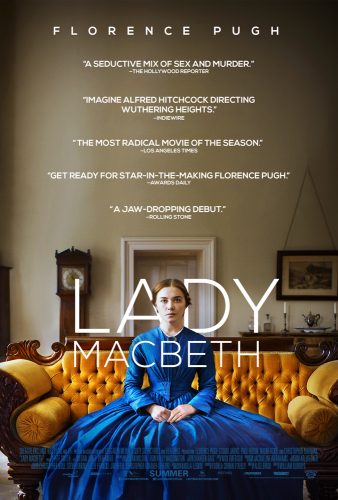Based on a Russian novella, Lady Macbeth of the Mtsensk District, this movie takes a bunch of tropes that we know and love in Romancelandia, turns them inside out, and then takes them to a (semi) logical conclusion.
We are familiar with the coupling that starts off with the bride essentially being bought because she comes with a chunk of land, and we’ve seen heroines married to someone who’s got a weird dominant vibe.
What we don’t usually see is how truly fucked up those situations can make a person.
Set in 1860s rural England, Katherine is married to Alexander, an older man who has no interest in sex, but much interest in humiliating her. She’s not allowed to leave the house or do anything, and generally exists in a stupor. When Alexander and his father are called away from the estate, she stumbles on one of the new grooms, Sebastian, and starts banging him, like, seriously and indiscreetly banging him, all over the place. This leads to a murder, which leads to another murder, which leads to a third murder, and things spiral out of control, as these things usually do.
For those with sensitivity to children in peril, there is a small child who comes to a sorry end.
There is no obvious mapping of story beats from the play Macbeth, but there are bits of inspiration and references. Katherine being the driving force of the narrative and Sebastian realizing he isn’t the protagonist of this story is one. There’s the entrance of a MacDuffan to complicate the story, and MacDuffans always need removal, usually in violent ways.
There are a bunch of interesting layers. If you start off your marriage to a woman by telling her she cannot leave the house, and tell her every night to take off her nightdress and face the wall while you whack off, and if you literally give her nothing to do but stare at the wall all day, I really feel like you can’t be that surprised…

The main servant that Katherine interacts with is Anna, played by Naomi Ackie (who had a role in one episode of Doctor Who, and a small handful of other parts). She’s also Black. The power differential between Anna and Katherine is complex: at the beginning, Anna is directing Katherine’s days, but by the end, when Katherine comes into her own… well, White Feminism is really toxic and results in Women of Color being thrown under the carriage.
Sebastian is played by Cosmo Jarvis, who is of Armenian descent. While it’s not stated outright, the fact that he looks like he’s not White adds a level of peril (for him) to the whole situation. The explicit Lady Macbeth references come in when Sebastian is freaking out over a murder they committed together, and she’s like (with blood stained hands), I did this for you! You can act like lord of the manor now!
But as with the theatrical Macbeth, the weight of the things he’s done weigh heavily on him, and he can’t handle it. So he’s gotta go.

As my friend (and Pajiba contributor) Kayleigh said, “It’s ‘Down with White Feminism’ The Movie!”
Florence Pugh, who plays Katherine, is amazing. William Oldroyd holds a lot of long, carefully framed shots, requiring the actors to convey a lot of the twitch of a facial muscle. Pugh radiates every emotion from her face without moving anything. She’s got a lot of buried rage, does Katherine, and when it comes out, it’s evil, narrowly focused.
A lot of scenes are played out in one wide take, and a lot of shots are held for a LONG time. The movie’s pacing is slow, but it’s a deliberate slow, not a “god, get on with it” slow. The long shots increase the sense of dread and discomfort, and there’s no music, no score. The rooms of the house are echoing, so the sound design implies a hollowness to everything. The screenplay is by Alice Birch. It’s her first movie, but she’s got a solid career in writing feminist plays, and exploring dark facets of being a woman. The playwright in her really shows in this script.
I thought this was a fascinating, dark, exploration of some tropes that I’ve enjoyed in lighter contexts. I’m very interested in what Pugh and Birch both do next.


Is that really a spoiler? Seems pretty self-evident to me…
The Opera staging tends to throw in fun moments. (Dom Deluise had a cameo at the Met when I saw it there mumblety-peg years ago.)
Doesn’t sound as if the movie does.
Saw this earlier at your recommendation. I felt really bad for Anna.